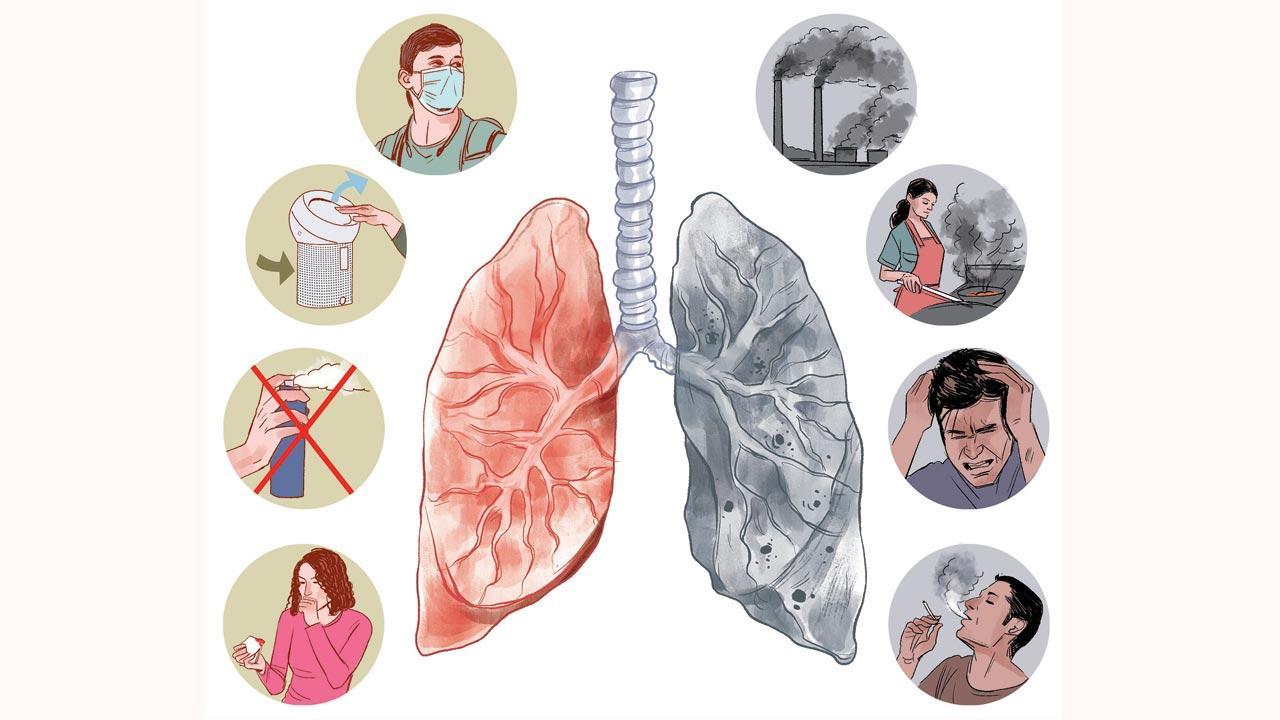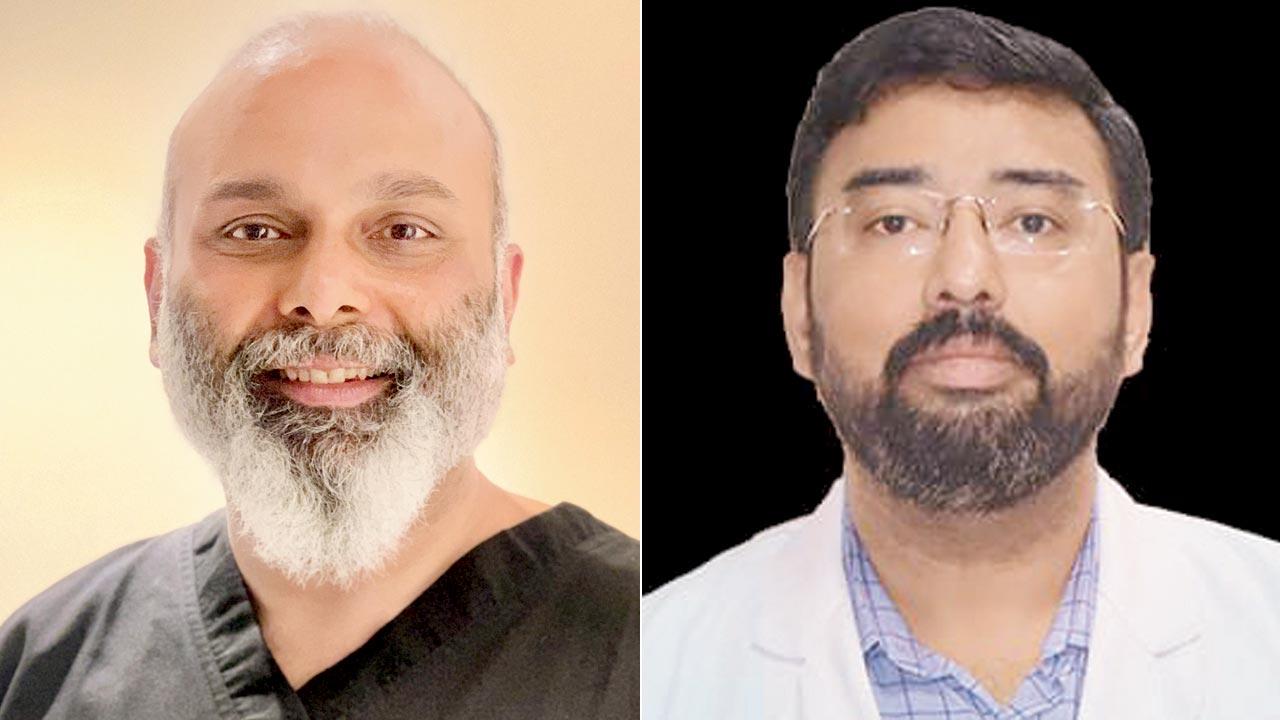A recent study reveals significant proportion of lung cancer patients have never smoked… just been inhaling life-threatening levels of pollution

Illustration/Uday Mohite
Peppered across news websites over the past several years are headlines describing the pitiful state of the environment. In a blow to those striving to improve physical health, reports reveal that breathing in a polluted city could be equivalent to smoking several cigarettes a day. A research published in The Lancet’s eClinical Medicine Journal found that not only were a significant proportion of lung cancer patients in India non-smokers, but also that the disease appears around a decade earlier in India than in western countries. Doctors found the study “not surprising, but thought-provoking”.
ADVERTISEMENT
Dr Kumar Prabhash, an author credited on the study, tells mid-day that several factors relating to the disease have come to fore. “One of them is that a good number of patients are non-smokers,” he says. “Abroad [this group comprises] 10 to 20 per cent; here, it is closer to 40 or 50 per cent. That is strikingly high.” He adds that pollution is proposed as a causative factor for the presence of the disease in such individuals. “We have lots of particulate matter in the environment because of [construction] work,” he says.
 Dr Lancelot Pinto, Consultant Respirologist, PD Hinduja National Hospital and Medical Research Centre; (right) Dr Prasanth Penumadu, HOD Surgical Oncology, Sri Venkateswara Institute of Cancer Care & Advanced Research
Dr Lancelot Pinto, Consultant Respirologist, PD Hinduja National Hospital and Medical Research Centre; (right) Dr Prasanth Penumadu, HOD Surgical Oncology, Sri Venkateswara Institute of Cancer Care & Advanced Research
The medical professionals we spoke to as part of this interaction agreed that environmental pollution—to which vehicular movement is also a contributor—needs to be tackled. It leads to a host of breathing problems, including emphysema, which, says Dr Lancelot Pinto, Consultant Respirologist, PD Hinduja National Hospital and Medical Research Centre, “is linked to a higher risk of | lung cancer”.
The prevalence of a large number of chest-related issues in India has been known to medical professionals. So has the fact that the southeast Asian community is home to a large number of non-smokers battling lung cancer. “But, this study revealed that the proportion of such individuals is larger than anticipated,” says Dr Prasanth Penumadu, HOD Surgical Oncology, Sri Venkateswara Institute of Cancer Care & Advanced Research, Tirupati. “Patients today receive personalised care, which wasn’t the case before, when every individual was, for example, given chemotherapy. Today, there are mutations [in people’s genes], and the treatment depends on the type of mutation.”
 Dr Kumar Prabhash, Tata Memorial Hospital; (right) Dr Pritam Kataria, HN Reliance Foundation Hospital and Research Centre
Dr Kumar Prabhash, Tata Memorial Hospital; (right) Dr Pritam Kataria, HN Reliance Foundation Hospital and Research Centre
While the study doesn’t dismiss the role of an individual’s genetic makeup, Dr Prabhash says “few people with lung cancer have a family history of the disease. We doubt those factors are related, but that doesn’t imply that [genetic history] should be ruled out as a risk factor.” Dr Penumadu backs his opinion, and points to a Taiwanese study which seemed to make a case for genetic predisposition. “But in my practice of 12 years, I may have seen one or two such cases. It’s definitely not common.”
And while in India the disease manifests in individuals who are a decade younger than those in the west, Dr Prabhash is quick to point out that the country’s demographics play a role in this statistical number. “If I don’t have a [certain kind of] population in my society, whatever I end up diagnosing will be done in the population set that does exist. In India, we are a younger population.”
Among the factors hindering diagnosis and treatment of lung cancer in India is the prevalence of tuberculosis, both of which, says Dr Prabhash present similarly. “The features of tuberculosis are similar to those of lung cancer, and that delays detecting the latter. Also, if one has tuberculosis, treating [lung cancer] can
become difficult because the drugs used [to treat TB] interfere.” Delay in detection implies that “many patients present in stage four. In the western world, a third of the patients undergo surgery, but here, only five per cent of them [can] do so [owing to] late diagnosis.”
So how can we protect ourselves? Dr Pinto advises wearing masks, “especially if you have breathing-related issues and are stepping into polluted areas. Also, remember that the air indoors can be more [polluted] than outdoor—air purifiers can help. Those running outdoors can revisit their decision. Running causes one to breathe faster, and increases the number of breathing cycles. If feasible, run indoors and use an air purifier.”
Finally, Dr Prabhash stresses the need to encourage research work. “We have far too little information about the Indian population. We need research to make a difference to our patients’ lives. The United States has almost 4,000 publications [published] in a year. In India, the number is 400. [Research] is where you get the solution. We are dependent on outside research to treat our patients. We also request society to participate in it. The more people come forward, the more solutions we can find.”
A cough persisting for several weeks is “most certainly” a reason to investigate further, say three of the doctors we spoke to. However, Dr Prabhash cautions against raising an alarm. “It may not be lung cancer for certain, but you should see a doctor. Also, if you cough up blood, seek advice. Finally, doctors themselves must be sensitive to the fact that not every cough [implies] tuberculosis,” he says, promising that advancement in medicine has improved the kind of treatment available to lung cancer patients. “If picked up early, the chances of cure are high.”
While precautionary measures for those exposed to smoke or polluted working conditions have been abundantly discussed, Dr Penumadu says it is tough to define the circumstances in which a non-smoker must seek advice. “Those who have been exposed to smoke, perhaps passively, can undergo some sort [of screening]. But it’s tough to precisely say when this group should seek help, if asymptomatic. When you talk about a country like India, and say you wish to screen individuals who are between ages 35 and 50, you will probably need to screen 70 per cent of the population. That’s impossible.”
Both Dr Pinto and Dr Kataria stress the need for legislative changes. The latter says, “Changes to reduce risks must be taken [by the government]. Unchecked cutting down of trees [must stop], and measures must be taken against [companies] that are building roads. Using air purifiers is not the answer. We need widespread measures.” Highlighting that the next two decades will be crucial in the country’s efforts to prevent cancer from becoming an epidemic, he says the increasing pollution levels must be tackled with urgency. Meanwhile, Dr Pinto questions the tendency to focus on individual measures. “If [polluted] water is flowing through our taps, we think about what steps we must take, [when in fact] we need to ask why [the water is polluted].”
 Subscribe today by clicking the link and stay updated with the latest news!" Click here!
Subscribe today by clicking the link and stay updated with the latest news!" Click here!







